Points of discussion in this guide include:
What is a Website Builder?

A website builder is a platform that takes all of the technical heavy lifting out of the equation. All of the technical coding and advanced designing happens behind the scenes, while the user sees all of the advanced features as easy-to-follow steps. Most builders let users either choose a predetermined template while also giving them the option to customize the site to perfectly fit their goals.
The evolution of the modern website builder has truly changed the way that business and individuals build their websites, making it easier than ever to have your own website.
Advantages of Using a Website Builder
By using a website builder, all of the technical work is handled by the platform. You don’t need to be a computer-savvy person to use them, and many of the best website builders on the market offer simple drag and drop functionality. If you can move a text box around with your mouse, you can build a website. Many website builders feature powerful social media, SEO, and e-commerce tools to help customize your site towards your goal. This boosts your customer engagement and helps you reach your visitors in new ways.
Most website builders also include professionally-designed themes that look great no matter what your business offers. Most people can design and launch their website in less than a day’s work, while it could take months when working with a website designer and developer.
Using a website builder is also much more affordable than working with a developer. To work with a highly-skilled developer, you could easily shell out a couple of thousand dollars just for the initial site. When you add the ongoing fees to monitor your site and keep it up to date into the equation, the costs can quickly skyrocket. While many large businesses have no issue investing in their website, most small businesses don’t have the budget.
Disadvantages of Using a Website Builder
The most significant disadvantage of choosing a website builder rather than building it from scratch is the lack of customization. While you can customize your site using the built-in tools, you’ll never be able to perfectly tailor your site as you would when building it from scratch.
Depending on the website builder tool you use, you might not have the option for further expansion in the future. As your business grows, you might need additional functionality to improve user experience and match your services. The problem is that it can be challenging to move your site to a different platform in the future when using some website builders. Designing from scratch means that you own everything on your site and if you decided to update it or switch hosting providers, you can without any issue at all.
Finally, when you use a website builder, the SEO and other digital marketing tools aren’t put at the forefront. When working with a professional web developer, they’ll work with SEO in mind to ensure your website is actually seen by customers once it’s live. They’ll also provide you with recommendations such as where to place the call to action buttons and more. Website building tools are there for you to simply drag around the boxes and create a site that looks good. With professional guidance, you can have a site optimized to drive attention and sales too.
WordPress
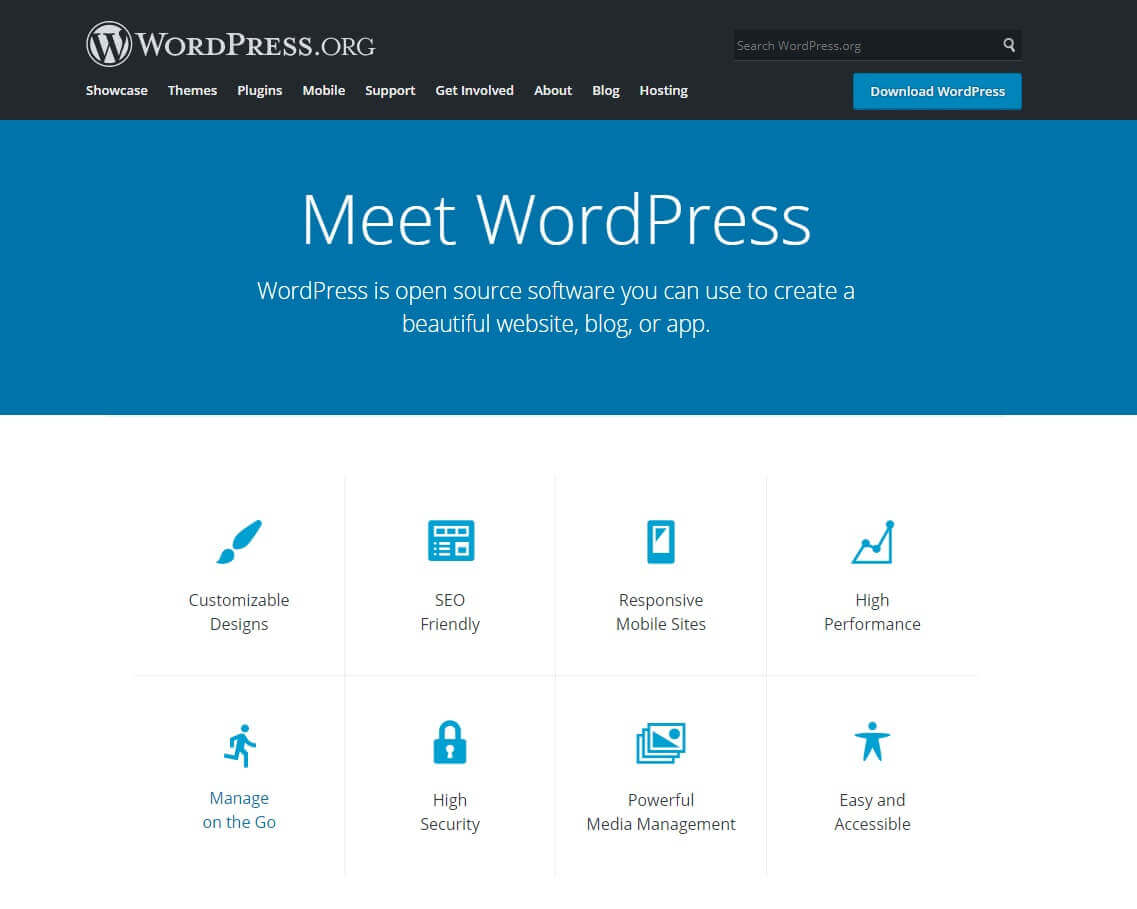
The self-hosted version of WordPress is the most popular website building platform in the world. In fact, over 25% of all websites in the world are built on WordPress. There are two versions to make a note of, the self-hosted and hosted version (WordPress.org and WordPress.com respectively).
The reasons that WordPress tops this list is the popularity, scalability, and ease of use for even beginning website builders. Downloading the software is free, but to get your site of the internet you’ll need to pay for a WordPress hosting account, or you can go to another host. It might sound complicated, but it actually isn’t that difficult.
Pros:
- Gives you complete control over every aspect of your website
- Easy to use drag and drop functionality
- Free to download and use
- Can be used for a variety of different sites including e-commerce, forums, blogging, etc.
- A wide selection of WordPress themes to choose
- Over 50,000 free plugins
Cons:
- A slight learning curve for completely new users without any web experience
- Need to find a hosting service or pay additional
- You’ll need to keep up with WordPress updates manually
Overall, WordPress is the best all-around option for most people. The flexibility that it provides without locking users down to one template makes it a great choice for a variety of businesses.
Wix

Wix is the popular choice for many budget-conscientious website builders. It is free to use and build your website, and they also offer free hosting, although your site will have the Wix badge throughout unless you pay for a premium plan. Wix is incredibly easy to use, and anyone can get started if they have even the slightest experience using computers.
Wix includes hundreds of pre-made templates for you to choose from, and you can also customize them from there to tweak the look and feel of the website to fit your brand and business. Wix also offers users a variety of apps and plugins to install to their sites to improve functionality and improve the user experience.
Pros:
- Free to use with free hosting
- A wide variety of website templates that anyone can use
- Customizability to tweak the look and feel of your website
- Drag-and-drop web design
Cons:
- Free and Connect Domain plans include Wix ads throughout your site, and you’ll have to pay for a premium plan to remove them.
- Moving your website from Wix to another host can be very difficult
- Even with the Connect Domain plan, you’ll still need to pay for the domain name from another source.
Overall, Wix is a great choice for a variety of different businesses. If you need something simple, don’t want to pay a lot for a website, and don’t mind branding from the builder at the lower-tier plans, Wix could be for you.
BoldGrid
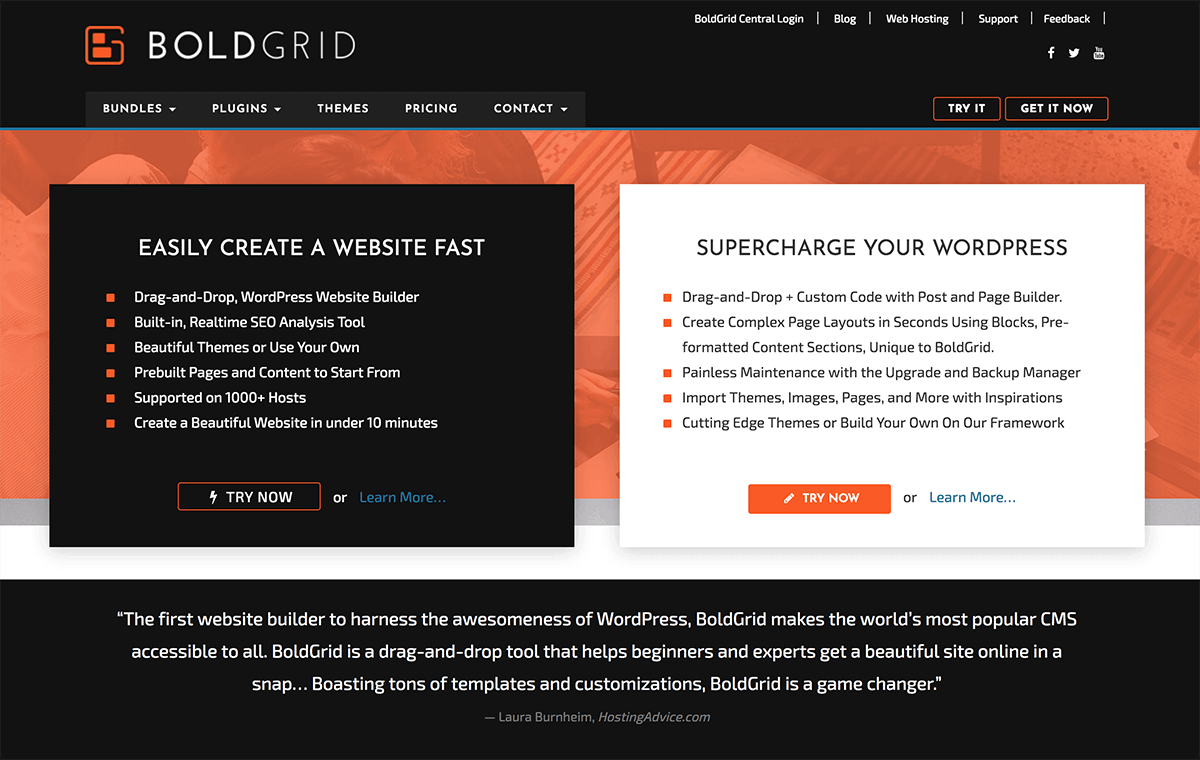
BoldGrid is a little bit different than the other options on this list in that it’s actually a plug-in for WordPress. BoldGrid is also available as a standalone website builder suite, however. The primary purpose of this builder is to make some of WordPress’s already easy to use features even simpler with endless customization.
Pros:
- Because it’s built on top of WordPress, you have access to all of WordPress’s features along with an extensive gallery of professional website themes.
- Drag and drop functionality makes it super simple for users to customize their website to fit their needs.
- Great option for staging websites. Test your site before it goes live to make sure it works perfectly.
- Great option for e-commerce sites with built-in tools and storefront features.
Cons:
- Because it runs on top of WordPress, you need an existing self-hosted WordPress website to make use of the plug-in.
- You’ll need to manage your website backups, but BoldGrid offers a tool for this.
Overall, BoldGrid is a good tool to use on top of your existing WordPress hosted site. You’ll need a WordPress site and a domain name to get started using BoldBrid, but once you do, you’ll immediately notice its benefits. The added functionality and customizability options make it a great addition to your WordPress site. The integration of e-commerce tools is also a nice additional feature for online sellers.
Weebly

Weebly is a great fully hosted website builder option for a variety of different businesses. You don’t need to have any previous experience coding websites or need to understand any technical jargon to use it. It includes a very handy page builder that lets you design your website following simple steps.
Because it’s fully hosted, you won’t need to install any software or work with many different services to get your website up and running. They also include around a dozen of pre-made website templates that you can use to get your website started. The live page editor is also a great tool for tweaking their templates to fit your website perfectly. It is also another great option for e-commerce sellers with built-in storefront tools.
Pros:
- Fully-hosted meaning you only work with Weebly and won’t need to subscribe to other hosting services.
- No software to download and all based in the cloud.
- Dozens of website templates to choose from with customizable options.
- Easy integration for e-commerce stores.
- Tons of built-in extensions such as contact forms, slides, photo galleries, and more.
Cons:
- One con of being a fully-hosted builder is that you are locked to the features that they offer and you can’t hire a third-party developer to add additional functionality to your website in the future.
- In the lower-tier plans, they will take a percentage of each sale made through an e-commerce site built with their tools.
Weebly is a great choice for people that need a fast and easy website with additional functionality. The added tools for e-commerce are also a nice feature, but you might want to consider the premium plans to avoid their transaction fees.
Shopify
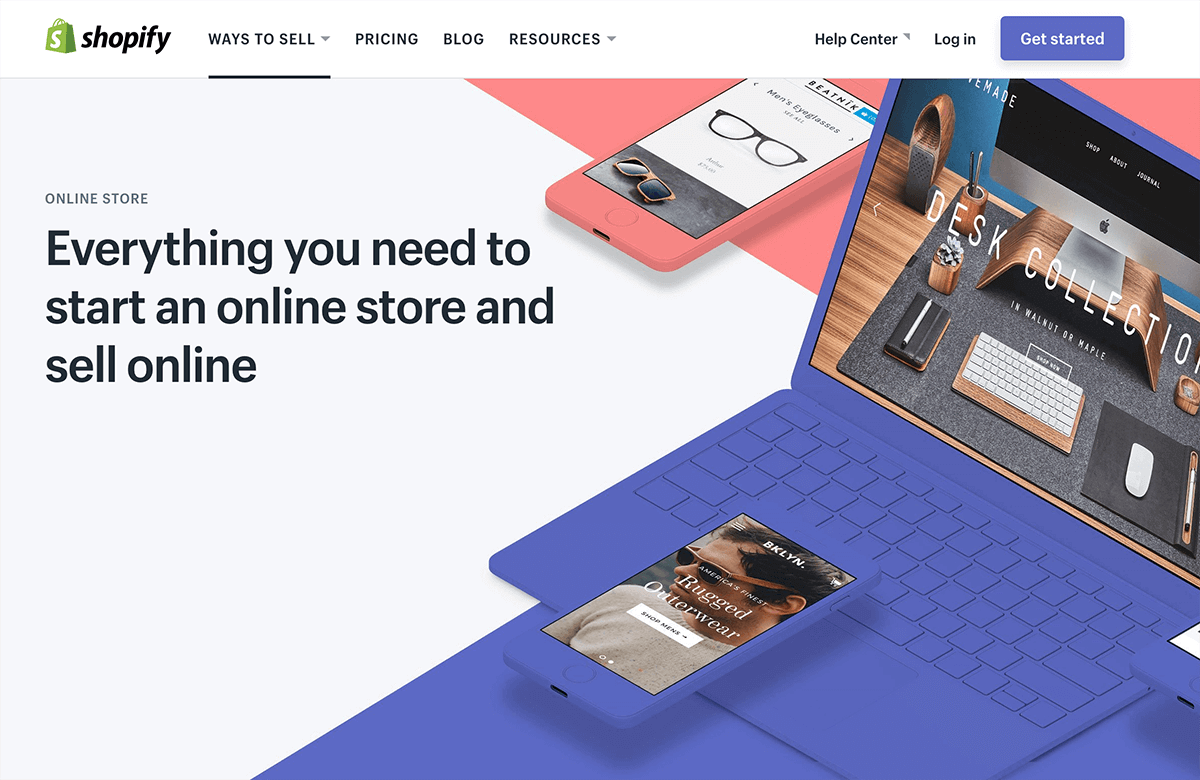
Shopify is one of the most popular options for e-commerce professionals. They have nailed the online store to a tee, and they make it incredibly easy to integrate your products and start selling. There are over 1 million users on the platform today, and they have helped sell over $40 billion worth of products over the years.
Shopify is an all in one hosting solution for e-commerce sellers. You won’t need to download additional software, work with an additional hosting service, and all of the updates and backups happen automatically. There is also an integrated payment solution, although users can choose to add their own payment system if they choose.
Shopify features easy drag and drop functionality for new website builders to quickly and easily build their store in no time. There are also practical marketing and statistical tools for sellers to track their store’s performance over time and keep everything running smoothly.
Pros:
- Easy to use drag and drop interface
- Powerful e-commerce tools like inventory management, payment management solutions, and sales statistics.
- Hundreds of templates and designs to choose from with customizable options.
- Easy integration into WordPress to get the best of both platforms.
Cons:
- Can be expensive for new users.
- Difficult to move your site to a different platform in the future.
If you want to be an e-commerce pro, Shopify is one of the best options. The platform is specifically designed for e-commerce and online selling and features many of the tools you would have to pay extra for otherwise. Their subscription plans can be more on the expensive side for new e-commerce professionals. If you aren’t in the e-commerce business, you might find a better value in other options on this list.
SiteBuilder.com
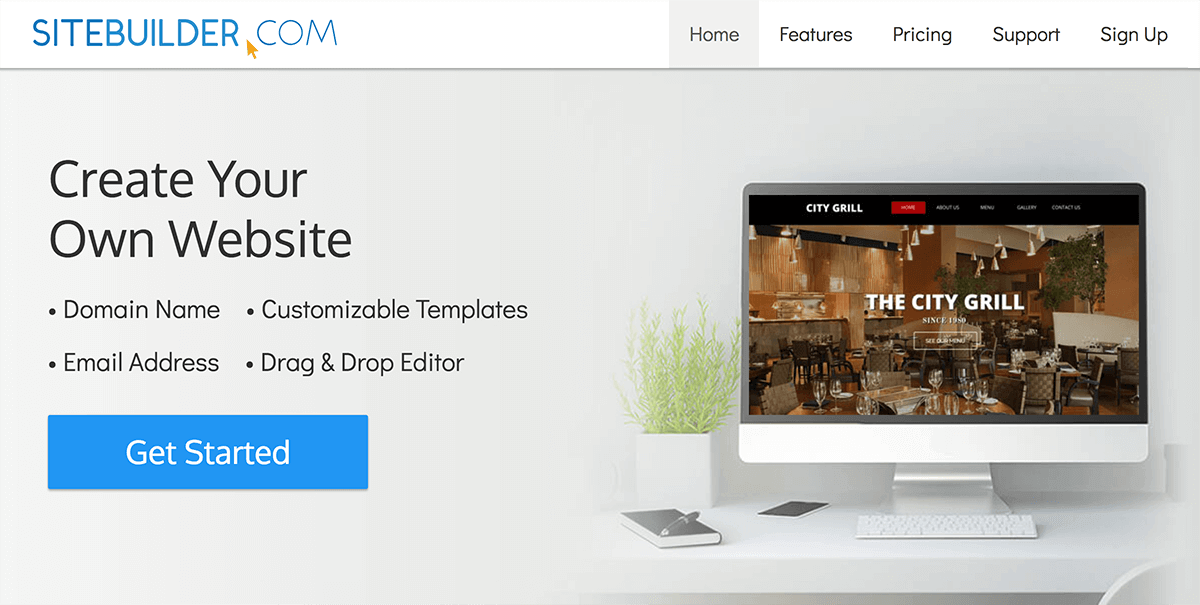
Another easy option that small businesses should consider in SiteBuilder.com. It is a fully hosted platform, meaning that they can take care of your website hosting without needing to work with another service. There are a bunch of powerful web design tools that don’t require any technical skills or website experience.
Pros:
- Full hosting with their all in one solution for websites.
- They are an all in one provider for website building, hosting, custom domain, dedicated email, and more.
- Thousands of website templates to choose from, with easy drag and drop customization. Everything is editable, and you can really hone the look and feel of your website.
- Automatic e-commerce integration with a free PayPal account and dedicated email.
Cons:
- Because they are a hosted platform, there are limits to the tools they offer and their features.
- The free plan includes ads which can make your website look unprofessional.
Sitebuilder.com is the best choice for people that need quickly build a website. It isn’t as feature-packed as many of the other platforms on this list, but it offers speed and convenience. If you only need a basic website just to get your business online, this could be a good choice for you.
Squarespace
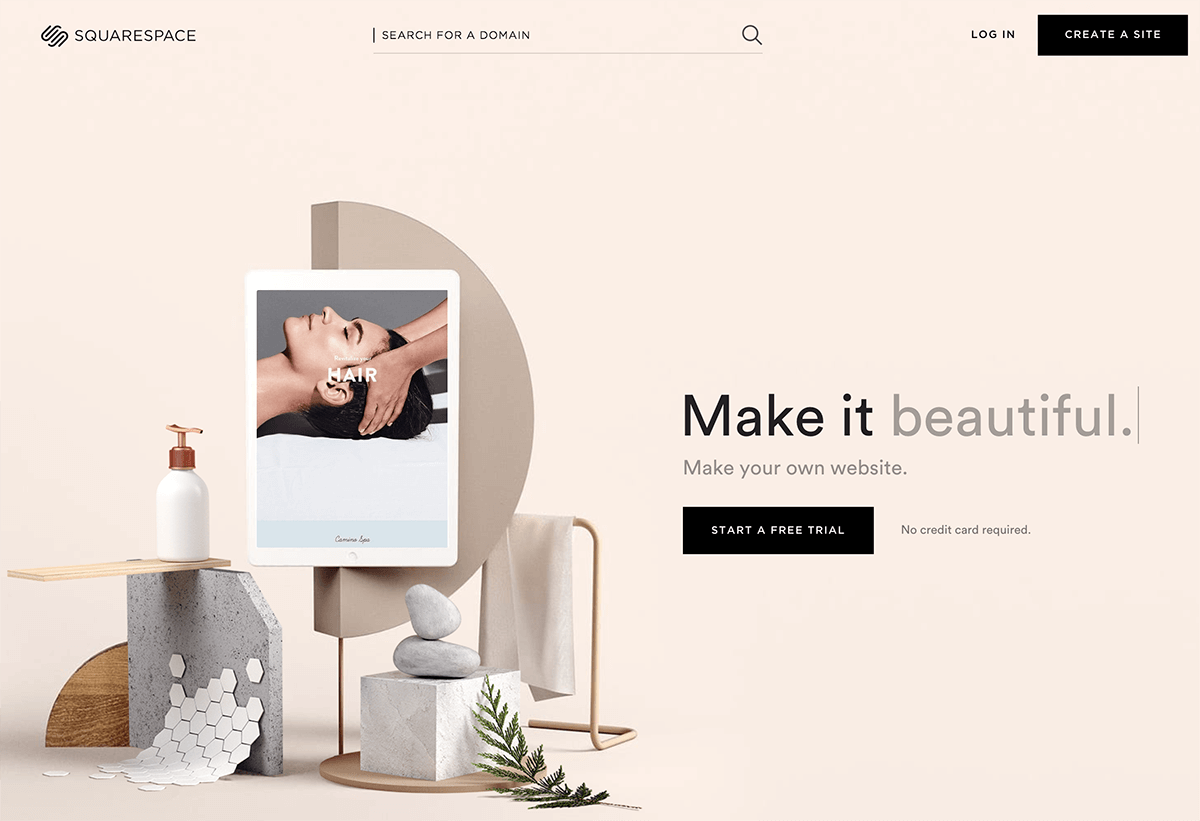
Squarespace is leading the charge to create a seamless and easy website building solution for small businesses and individuals alike. The drag and drop functionality is seamless, and users don’t need any prior website experience to get started.
It is also a solution for e-commerce professionals as well, and users can addon separate extensions to make their site more functional for users. Also, you can also purchase a custom domain through Squarespace, and they can host your website as well.
Pros:
- Incredibly easy to use, even for people with no prior technical experience.
- Great selection of website templates and designs to choose
- Can purchase a custom domain through Squarespace
- Offers e-commerce functionality
Cons:
- Some features are limited for more advanced users
- The Personal Plan has limits such as the number of pages, contributors, etc. that advanced users might find constraining.
- Third-party integration is somewhat limited compared to other solutions on this list.
Overall, Squarespace is the best solution for small businesses that need a website now to boost their online presence. It doesn’t take much manual effort to get your website up and running, and the pre-made templates look professional. If you need more functionality or want to dive into advanced features, a more well-equipped builder might be a better selection.
GoDaddy Website Builder
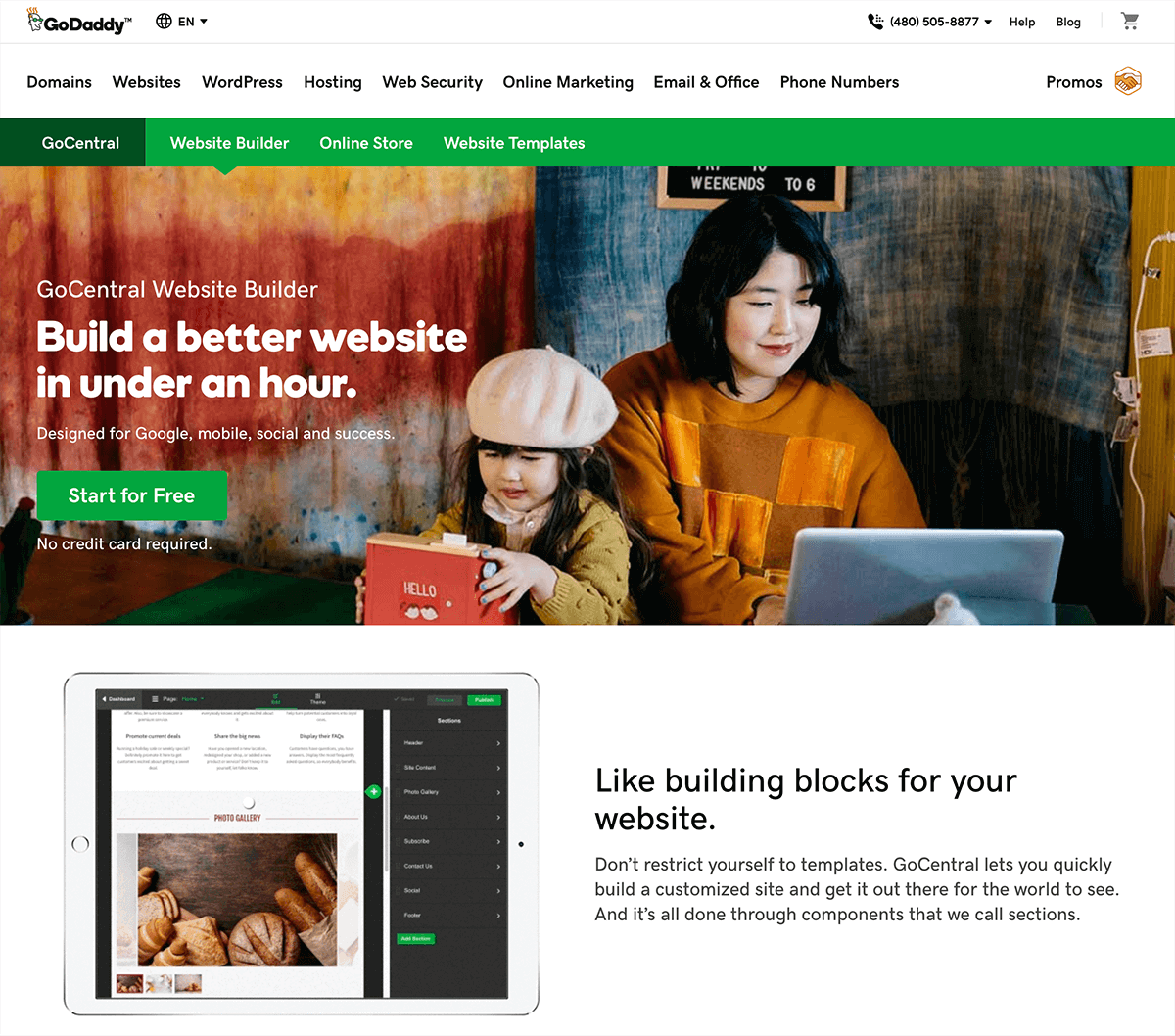
GoDaddy is best known for their hosting and domain name services along with their Super Bowl commercials. They also offer an intuitive website builder as well. The tool is simple to use (just like most of the other entries in this list) and can produce very professional websites. They include a variety of extensions and plug-ins like photo galleries from Getty Photography that you can use on your website.
Pros
- Easy to use with drag and drop functionality
- Work on your website from your tablet or smartphone while on the go
- Library of professional images saves you the time or hunting down stock photos and purchasing licensing fees.
- A great tool to use if you’re already using GoDaddy for hosting or for your domain name.
Cons
- Somewhat limited in features compared to other options of this list.
- Fewer design options to choose
- Difficult to move your website to WordPress if you decide you need more functionality down the road.
GoDaddy’s website builder is a great tool if you only need a basic website. It’s design features are somewhat limited, but every site built with the platform looks very professional. If you don’t need much out of your website, this is a good pick. If you want to tweak and customize every element, however, another choice might be best.
iPage Website Builder
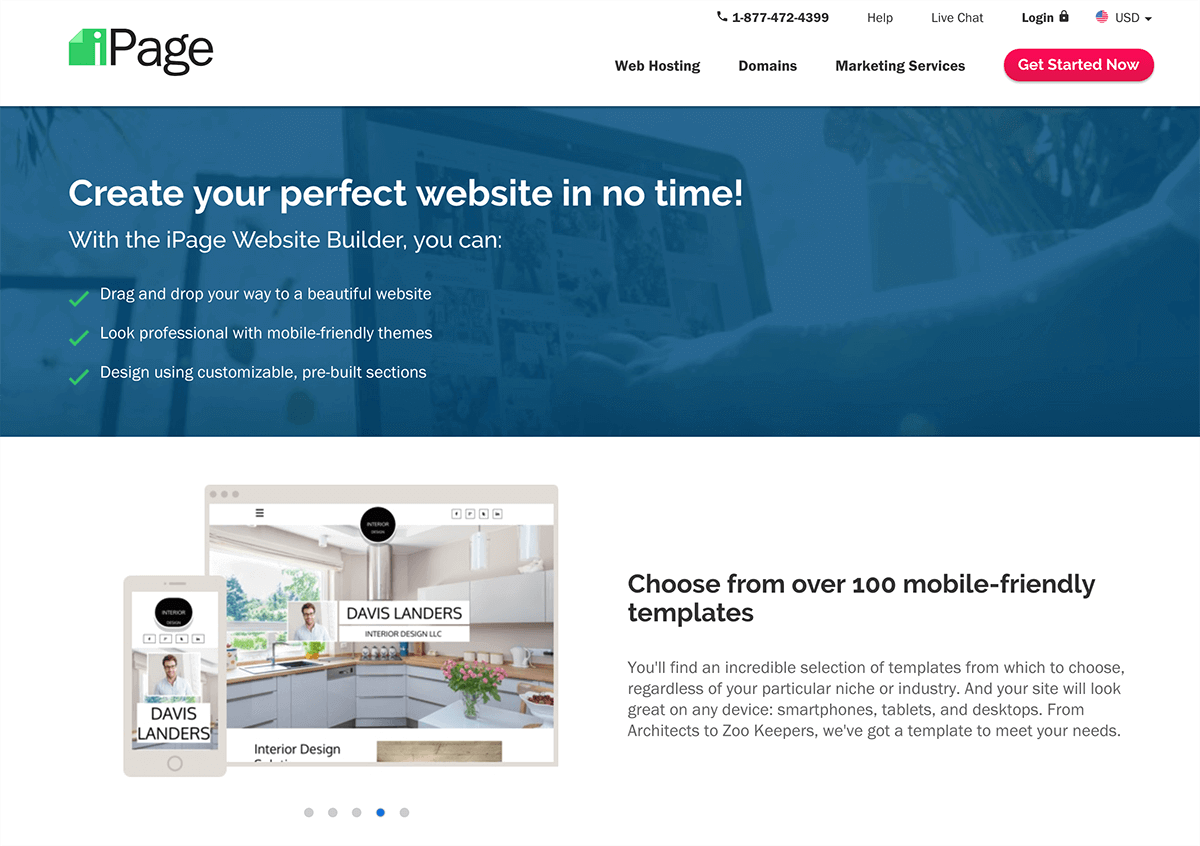
iPage specializes in providing hosting services, but also offer a website building tool also. The builder is easy to use with drag and drop functionality. The builder also features tools for SEO, social media, and you can choose from over one hundred pre-designed templates that are optimized for mobile.
Pros:
- Easy drag and drop functionality
- If you’re already an iPage hosting customer, the builder tool is free although the premium version has more features.
- Over 100 professional website templates
- Additional features like SEO settings, image galleries, and social media tools built-in.
Cons:
- Somewhat limited in features
- No support for third-party extensions, plug-ins, and additional features.
- Not much room for future expansion.
This tool is best for people that need a simple website solution. It doesn’t have as many features as other options on this list, but there are enough to help any small business get their functional website off the ground. The added SEO and social media tools are also a nice bonus. If you’re already an iPage customer, it might be worth it to see the builder in action. If you need more advanced functionality, you might be better off with a more capable CMS platform like WordPress.
Webs.com
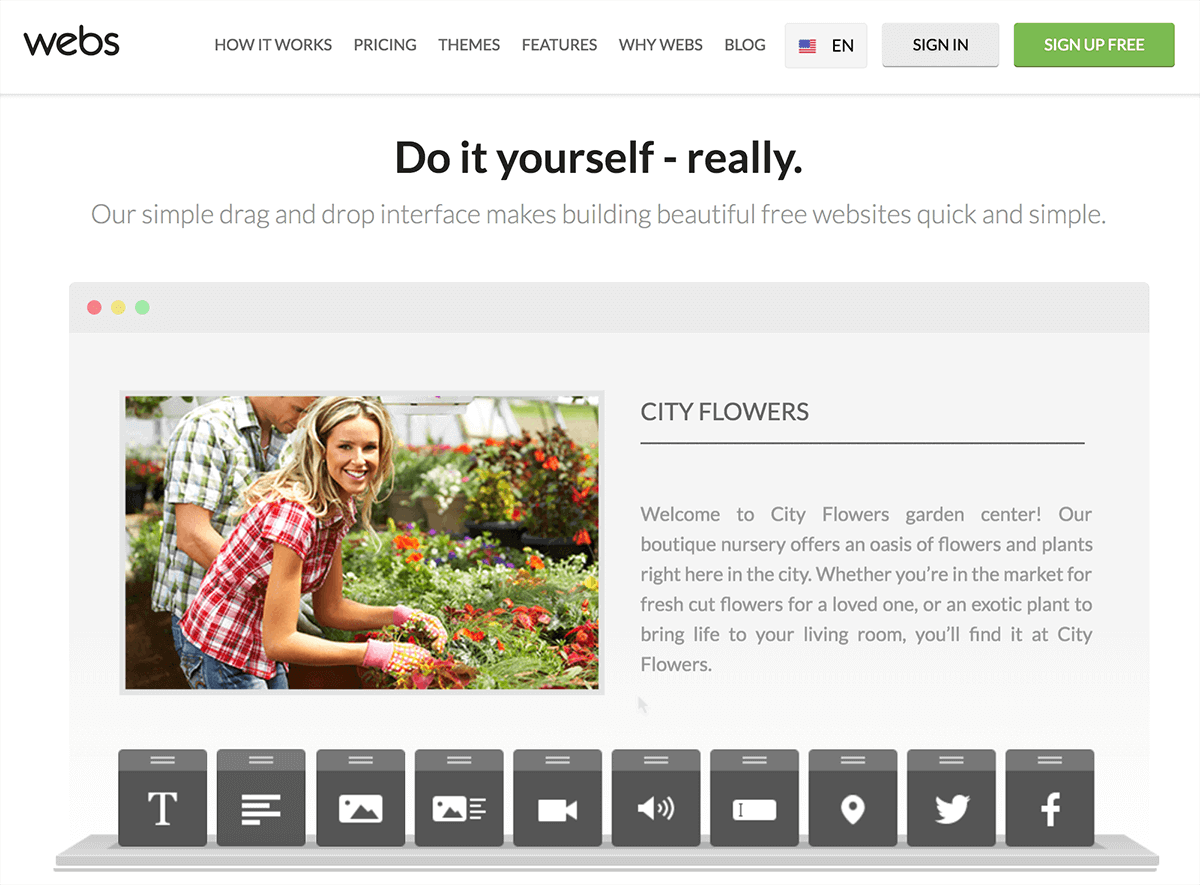
Webs.com is an excellent solution for small businesses and individuals that need an intuitive, and easy to follow website builder. There are tons of pre-made website design templates included with Webs along with e-commerce functionality in the premium plans. It is also a fully-hosted platform so you won’t need to download any additional software or work with a different hosting service.
Pros:
- Intuitive building features that anyone can use
- Dozens of professionally-designed templated to choose from with some customizable options.
- Drag and drop functionality to easily configure text, columns, images, and more.
- Free custom domain with premium plans.
Cons:
- Limited features without support for third-party extensions and plug-ins.
- Not ideal for content-rich websites or users that need advanced functionality.
The Webs.com website builder tool is ideal for small businesses with little custom requirements and simply need a website to boost their online presence. It’s incredibly easy to build a website using the platform, but its limited features might not be ideal for everyone.
Summary
While you can’t go wrong with any of these website building tools on this list, some will offer more than others. Think about your goals with your website and the purpose it will serve you and your visitors.
Try a few that are free, and start trying new things. You’re now one step closer towards launching your best website!





i’ve heard these are bad for SEO but I guess if you’re just getting started it’s a way to get your foot in the door
Very useful and informative post regarding website builders. Details description which is very important knowledge for new website builders. I like to share it and thank you so much to the writer for this useful information.
your post is amazing. I would bookmark your website for more information.
Great site